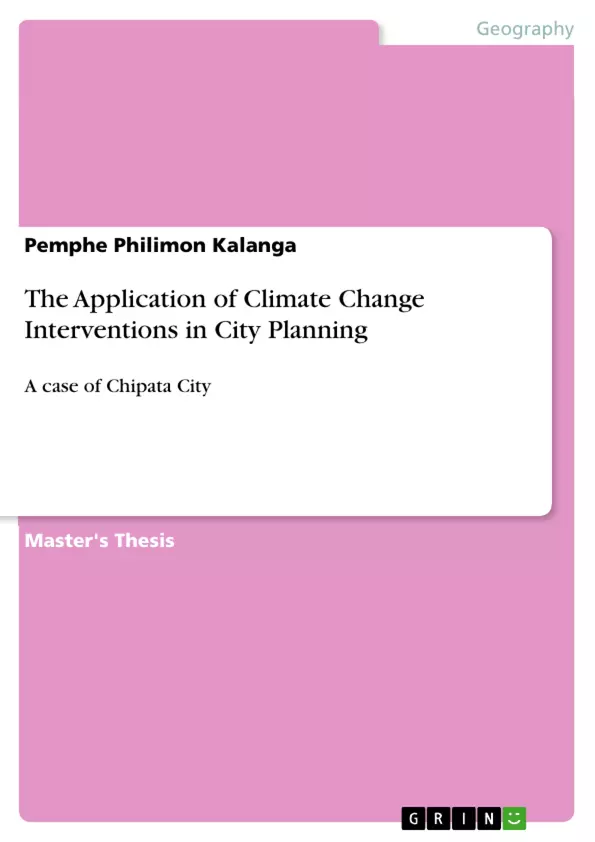The aim of the study was to explore the application of climate change adaptation interventions in city planning for building a resilient city of Chipata. The research objectives were to analyze the climate change adaptation interventions used by city planners, to assess the inclusion of policies and legislations related to adaptation interventions in city planning, and to examine challenges faced by city residents in relation to climate change effects.
Since cities are intense centers of population and are home to over half of the world’s assets and economic activities, any impact or disruption, be it natural or human caused, has the impending prospective effect to the majority. For instance, floods will affect vast numbers in the city, while the same degree of floods will affect a few if it occurred in rural set up, since rural households are scattered compared to those in the city. With the pervasive threats of climate change effects on Cities, the application of Climate Change adaption interventions into City Planning is becoming a prime issue. Climate Change will contribute significantly to the multiplication of urban risks and achieving the agenda for 2030 on Sustainable Cities will prove futile without first addressing climate change concerns.
The question, however, is, has cities in Zambia integrated climate change concerns in their planning of cities? City planning involves, among other issues, land use which would help to reduce the number of properties at risk to flooding and storm water damage, infrastructure development through building codes and design standards for more resilient structures to flooding. Other factors involved in city planning include; city services, ecological planning, strong and waste management, housing and building improvement, and site plan. Planning of City cannot be circumvented if climate change is to be methodically tacked in cities. While there is an urgent need for urban planners to develop a robust and clear strategy for dealing with climate impacts, there is very little knowledge about how planners and households are able to address the challenges posed by climate change. Further, much attention in climate change fight has centered on national level actions and much of these interventions are done in an ad-hoc manner, with little knowledge about such actions being carried out in particular cities.
Inhaltsverzeichnis (Table of Contents)
- CHAPTER ONE: INTRODUCTION
- 1.1 Background to the Study
- 1.2 Statement of the Problem
- 1.3 Research Objectives
- 1.4 Research Questions
- 1.5 Justification of the Study
- 1.6 Scope of the Study
- 1.7 Limitation of the Study
- 1.8 Definition of Terms
- CHAPTER TWO: LITERATURE REVIEW
- 2.1 Introduction
- 2.2 Conceptual Framework
- 2.3 Climate Change and its Impacts
- 2.4 Adaptation and Mitigation to Climate Change
- 2.5 Climate Change Adaptation in Urban Planning
- 2.6 The Impact of Climate Change on Cities
- 2.7 Urban Planning Considerations for Climate Change Adaptation
- CHAPTER THREE: RESEARCH METHODOLOGY
- 3.1 Introduction
- 3.2 Study Area
- 3.3 Research Design
- 3.4 Population and Sampling Techniques
- 3.5 Data Collection Methods
- 3.6 Data Analysis
- CHAPTER FOUR: PRESENTATION, ANALYSIS AND DISCUSSION OF FINDINGS
- CHAPTER FIVE: SUMMARY, CONCLUSIONS AND RECOMMENDATIONS
- 5.1 Introduction
- 5.2 Summary of Findings
- 5.3 Conclusion
- 5.4 Recommendations
Zielsetzung und Themenschwerpunkte (Objectives and Key Themes)
This dissertation investigates the integration of climate change adaptation measures into urban planning in Chipata City, Zambia. The study aims to assess the extent to which climate change concerns are factored into planning strategies, identify challenges encountered in incorporating adaptation considerations, and examine the impact of climate change on city residents related to urban planning.
- Climate Change Adaptation in Urban Planning
- Impact of Climate Change on Cities
- Challenges in Integrating Climate Change Adaptation into Planning
- Climate Change Adaptation Interventions in City Planning
- Climate Change Challenges Faced by City Residents
Zusammenfassung der Kapitel (Chapter Summaries)
Chapter One provides an introduction to the study, outlining the research problem, objectives, and scope. Chapter Two presents a comprehensive literature review, exploring the concepts of climate change, adaptation, mitigation, and their implications for urban planning. Chapter Three details the research methodology, including the study area, design, data collection methods, and analysis techniques.
Schlüsselwörter (Keywords)
The dissertation focuses on climate change adaptation, urban planning, city planning, climate change interventions, climate hazards, sustainable development, and urban resilience in the context of Chipata City, Zambia.
Frequently Asked Questions
What is the focus of the Chipata city planning study?
The study explores how climate change adaptation interventions are integrated into the urban planning of Chipata, Zambia.
Why is urban planning crucial for climate resilience?
Effective planning manages land use, building codes, and waste management to reduce risks like flooding and storm damage.
What challenges do city residents face regarding climate change?
Residents often deal with increased urban risks, such as infrastructure damage and health hazards caused by environmental disruptions.
Is climate change integrated into Zambian city planning?
The dissertation examines this question, noting that while urgent, knowledge on how to address these challenges at the local level is often limited.
What are the key goals for a "resilient city"?
Goals include sustainable land use, improved housing standards, and robust site planning to tackle methodical climate impacts.
- Arbeit zitieren
- Pemphe Philimon Kalanga (Autor:in), 2021, The Application of Climate Change Interventions in City Planning, München, GRIN Verlag, https://www.grin.com/document/1265474



